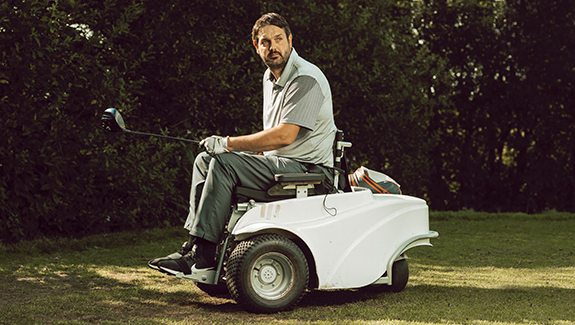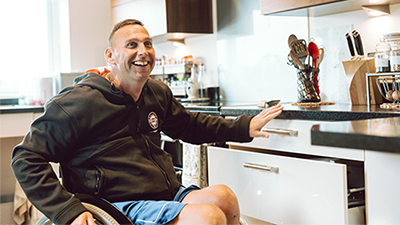The Changing Dynamic of Friendships After Spinal Cord Injury
Read advice and insights from two inspiring people who experienced friendship changes after their spinal cord injury, including the reigniting of old relationships.

Learn how Kris and Shaun managed friendship changes post-injury.
This article is based on interviews with Sue Lennon. Sue is a nurse, therapist, educator, and coach with nearly three decades of experience in oncology nursing – including urology and stoma care. She values nurse-patient communication and provides truly holistic care.
In the early days and months after a spinal cord injury, friendships and social circles go through an evolution that can strengthen existing relationships and even create new ones. On the other end of the spectrum, however, a traumatic event like this can sometimes cause friends to feel uncomfortable or insecure. Everyone’s post-injury experience with friendships is highly unique, and likely a mix of supportive and challenging encounters.
What happens with friendships after a spinal cord injury can depend on the strength of the relationships before the trauma and the maturity level of the friends. This is illustrated by the different experiences of two gentlemen: Kris Aves and Shaun Gash, who both live in the UK. Kris was injured in his mid-thirties. He benefited from having a more mature support system, and even experienced some surprising, rekindled relationships. Shaun was injured in his early twenties. He had mostly young friends and some had a hard time coping with the change.
Although Kris and Shaun had very different experiences post-injury, they both have insights into the value of supportive friendships. They’ve also learned that having a positive attitude can help you deal with the more challenging ones.
Kris Aves: Discovering a strong support system and rediscovering old friends
In March of 2017 at age 35, Kris Aves was left paralysed after he was hit by a van in the Westminster Bridge terrorist attack. The off-duty police officer was picking up an award that day and was crossing the bridge to celebrate with his colleagues. Kris continued to work for nearly four years after his recovery, but recently filed for medical retirement. “Even though I’ve retired, I’m moving forward,” said Kris. “I've got loads of goals to work on and am restarting my life.”
Recalling the first few days and weeks after he was struck, Kris was genuinely surprised by the support he received from his many friends and coworkers. The outpouring even caught the attention of the hospital staff. “The nurse who headed the spinal unit for 15 or 20 years told me that she had never had a patient with so many guests,” says Kris. “It wasn’t just my family, but my partner's family as well. All of my friends from the Metropolitan Police. All my golfing friends.”
What shocked him most was hearing from friends who had not contacted him in a long time. “In my early 20s, I was a holiday rep, working in places like Greece, Turkey, and Italy – and all my old rep friends got back in contact with me; people were driving from north of the country and Scotland to come down and visit me,” says Kris. “And then there were my school friends and the friends I grew up with, you know, long nights at our little local pub; everyone took time to come and see me, no one disappeared; people piped up to send their love and see how I was.”
Based on his experience, Kris offers some advice for those with a spinal cord injury who may hesitate to reach out to their friends and family when they need help or somebody to listen. “I would recommend talking to people if you’ve got any worries about anything about your body, your appearance, or any changes that you might be going through,” says Kris. “Try not to hold things in because that’s where slumps can start, so definitely talk about things and research things as well.” Kris also encourages people to stay active. “You need to get up and get out there,” says Kris. “Get up in the morning, get dressed, and go out. Do some bits and pieces. Invite friends over and just try to enjoy your life to the max, whatever the maximum is that you can do.”
Shaun Gash: Finding strength in adversity

Like Kris, Shaun Gash also found inspiration in adversity after a spinal cord injury. In 1991, Shaun was in a serious car accident that nearly cost him his life. He became a T5/T6 paraplegic and is now in a wheelchair. He was in his 20s when the crash happened and still vividly remembers the sinking feeling he got when he realized that some of his friends were trying to evade him.
“I saw that some individuals who had been in the accident with me crossed the road to avoid me; it was their way of dealing with it, and they were embarrassed or upset or whatever,” says Shaun. “But I don't think they realized the emotional impact it had on me when they weren't prepared to come and talk to me.”
What Shaun experienced can be common after a spinal cord injury. Regardless of how strong friendships were before a traumatic event, odds are there will be some people that have a difficult time dealing with the aftermath. They may sometimes act in insensitive ways, even though that may not be their intention. Or they may simply feel too uncomfortable to navigate a conversation.
“I'm an open book, so I can accept things and move on,” says Shaun, who has shown remarkable resiliency and influences others to live life fully after a spinal cord injury. “But people deal with things in different ways, and that’s OK because we're not all going to be laid back about it.”
One of the more poignant lessons Shaun learned in the early post-injury days, as he saw the dynamics of his social circle change, was that accepting himself and the constantly evolving nature of friendships were two big keys to forgiveness, and to moving on to better and more fulfilling relationships.
“Who comes into your life? Who goes out of your life? Whether you're in a chair or not in a chair, friendships come and go. It’s just more emphasized when you're in a vulnerable position, because then you overthink things and overanalyze situations,” says Shaun. “If anybody is going through that stage early on, try not to worry about it and get upset because it's just a journey that we all go through.”
Financial Disclosure: Kris and Shaun received compensation from Hollister Incorporated for their contributions to this article.
The testimonials, statements and opinions presented are applicable to the person depicted. These testimonials are representative of that person’s experiences, but the exact results and experience will be unique and individual to each person.




